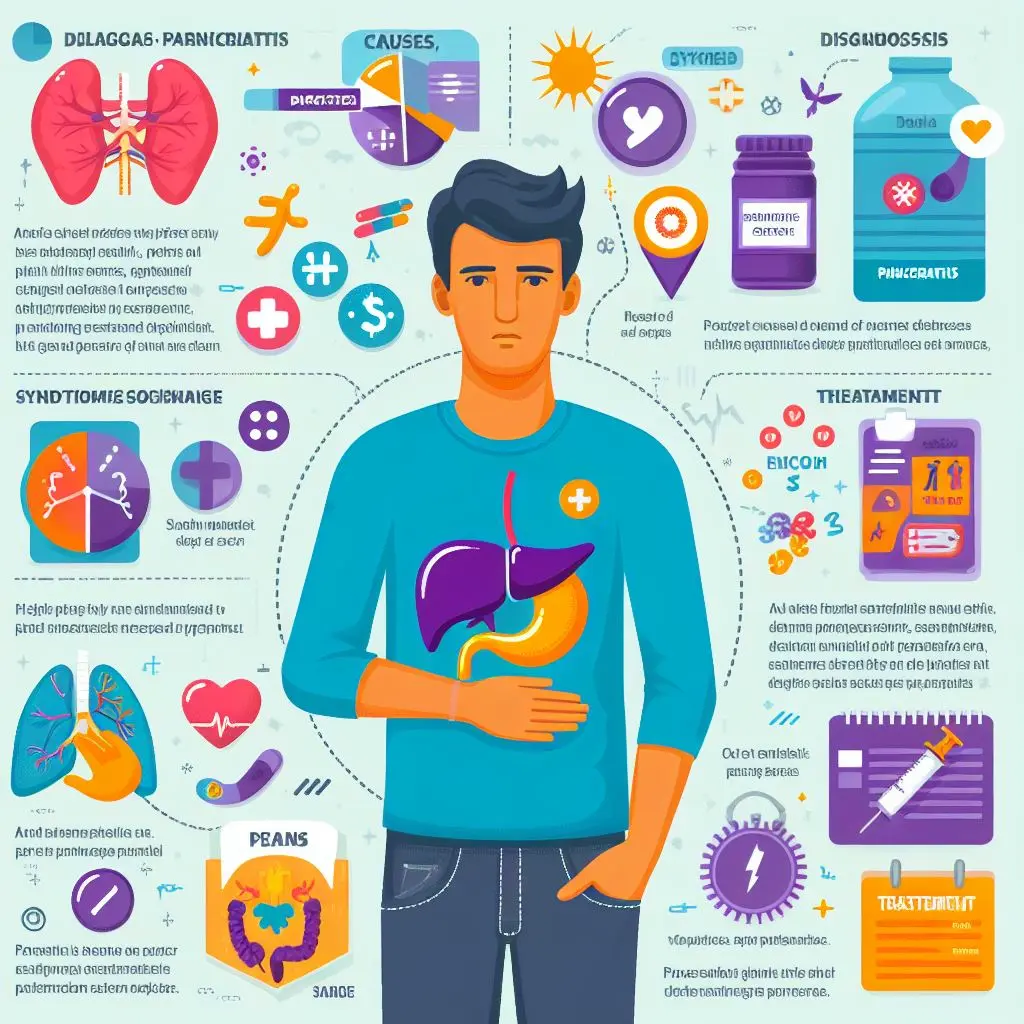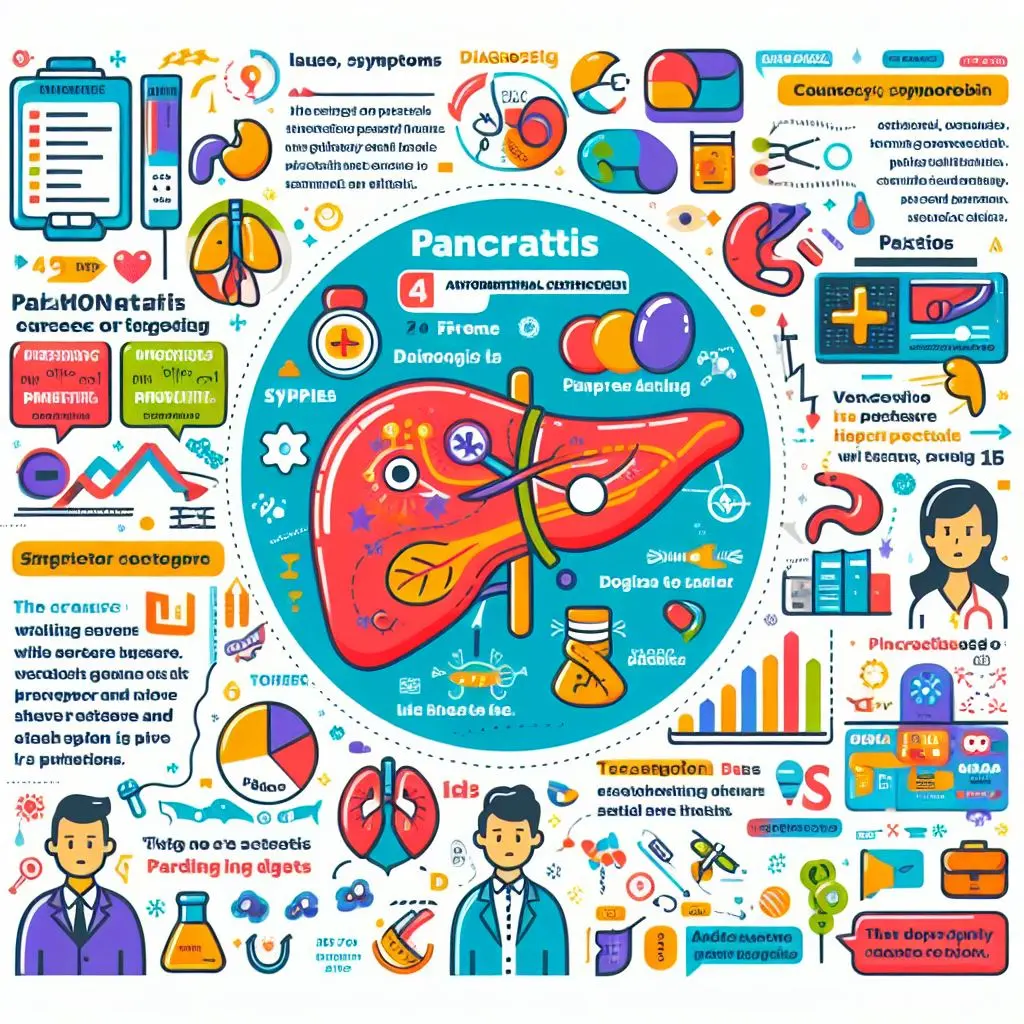Table of Contents
- Introduction
- What is Chronic Pancreatitis?
- Recognizing the Symptoms of Chronic Pancreatitis
- The Triggers and Causes of Chronic Pancreatitis
- Exploring Treatment Options for Chronic Pancreatitis
- Managing Life with Chronic Pancreatitis
- When to Seek Medical Advice
- Conclusion
- FAQs
Introduction
Dealing with chronic conditions can often feel like navigating through a maze without a clear exit. Among these, chronic pancreatitis stands out due to its complexity and the profound impact it has on individuals’ lives. But what exactly are the chronic pancreatitis symptoms you should be aware of? More importantly, are there effective pancreatitis treatment options available? This blog post aims to shed light on chronic pancreatitis and its associated pancreatitis symptoms, offering you a beacon of hope and guidance.

What is Chronic Pancreatitis?
Chronic pancreatitis is a prolonged inflammation of the pancreas that does not heal or improve—it gets worse over time and leads to permanent damage. Before diving deeper into the particulars, let’s first understand the pancreas’s role. Click here to learn more about the function of the pancreas.
Recognizing the Symptoms of Chronic Pancreatitis
The journey to diagnosis often begins with recognizing the symptoms. Chronic pancreatitis symptoms may include but are not limited to:
- Severe abdominal pain
- Nausea and vomiting
- Weight loss without trying
- Oily, smelly stools (steatorrhea)
Understanding these symptoms is critical for early detection and management. Discover more about these symptoms and what they mean.
The Triggers and Causes of Chronic Pancreatitis
Several factors can trigger chronic pancreatitis, including heavy alcohol use, gallstones, certain medications, and genetic predisposition. This section will explore the common and less known triggers that could be contributing to your condition.
Exploring Treatment Options for Chronic Pancreatitis
Treatment for chronic pancreatitis focuses on relieving pain, improving pancreatic function, and managing complications. Options may include:
- Enzyme supplements to aid digestion
- Changes in diet
- Pain management techniques
- Surgery in severe cases
For a detailed guide on pancreatitis treatment, including lifestyle and dietary changes, click here.
Managing Life with Chronic Pancreatitis
Living with chronic pancreatitis demands adjustments in various aspects of life, from diet to stress management. This section provides practical advice and tips to manage symptoms and improve quality of life, such as:
- Staying hydrated
- Eating a low-fat diet
- Avoiding alcohol
Discover strategies for coping with chronic pancreatitis in everyday life here.
When to Seek Medical Advice
Recognizing when to seek help is paramount. If you experience intense or worsening symptoms, it’s crucial to consult a healthcare professional immediately. Early intervention can prevent complications and enhance the effectiveness of pancreatitis treatment.
For guidance on when to seek medical advice, visit this resource.

Conclusion
Understanding chronic pancreatitis symptoms and navigating the available treatment options are crucial steps toward managing this complex condition. By remaining vigilant about the symptoms and proactive in pursuing treatment and lifestyle adjustments, individuals affected by chronic pancreatitis can lead fulfilling lives despite the challenges. Remember, seeking professional medical advice at the onset of symptoms is key to effective management and prevention of complications.
If you found this information helpful, don’t forget to share it with those who may also benefit. Together, we can spread awareness and foster a supportive community for those affected by chronic pancreatitis.
Further Reading on Chronic Pancreatitis
Frequently Asked Questions:
Q: How long can you live with chronic pancreatitis?
A: The life expectancy for individuals with chronic pancreatitis varies, and it depends on factors such as the severity of the condition, underlying causes, and effective management. Seeking medical advice for personalized information is crucial.
Q: Why does my stomach and back hurt?
A: Stomach and back pain can have various causes, including digestive issues, muscle strain, or underlying medical conditions. Consult with a healthcare professional to determine the specific cause based on your symptoms.
Q: Can stress cause pancreatitis?
A: While stress is not a direct cause of pancreatitis, it can exacerbate existing health conditions. The primary causes of pancreatitis include gallstones, alcohol consumption, and certain medical conditions.
Q: Can pancreatitis cause constipation?
A: Yes, pancreatitis can lead to digestive issues, including constipation. Symptoms may vary, and consultation with a healthcare professional is recommended for an accurate diagnosis.
Q: Is pancreatitis hereditary?
A: Some cases of pancreatitis may have a genetic component, increasing the risk. Genetic counseling is advisable for individuals with a family history of pancreatitis.
Q: Is coffee bad for pancreatitis?
A: While individual responses vary, some people with pancreatitis may find that limiting or avoiding caffeine, including coffee, can help manage symptoms. It’s best to consult with a healthcare professional for personalized advice.
Q: What is the best pain medication for pancreatitis?
A: Pain management for pancreatitis often involves medications prescribed by a healthcare professional, which may include nonsteroidal anti-inflammatory drugs (NSAIDs), acetaminophen, or other pain relievers. Consultation with a healthcare provider is essential for tailored recommendations.
Q: Can you die in your sleep from pancreatitis?
A: Severe cases of pancreatitis can lead to life-threatening complications, but dying in one’s sleep specifically from pancreatitis is rare. Timely medical attention is crucial for a better prognosis.
Q: Does omeprazole help pancreatitis?
A: Omeprazole, a proton pump inhibitor, is used to reduce stomach acid. While it may help manage certain symptoms, it does not directly treat pancreatitis. Consultation with a healthcare professional is necessary for appropriate treatment.
Q: How does pancreatitis affect the liver?
A: Chronic pancreatitis can lead to complications affecting the liver, such as inflammation and scarring. The extent of the impact varies, and regular medical monitoring is crucial for managing potential complications.
Q: When I eat, my back hurts. Why?
A: Back pain after eating may be related to various causes, including gastrointestinal issues, gallbladder problems, or musculoskeletal conditions. A healthcare professional can help identify the specific cause based on your symptoms.
Q: Why does pancreatitis cause gas?
A: Pancreatitis can affect the digestive process, leading to gas and bloating. Digestive issues are common symptoms, and seeking medical advice is recommended for proper diagnosis and management.
Q: Can diabetes caused by pancreatitis be cured?
A: Diabetes resulting from pancreatitis may improve with proper management of the underlying pancreatitis and lifestyle modifications. However, a complete cure may not always be achievable.
Q: Can urgent care diagnose pancreatitis?
A: Urgent care facilities can provide initial evaluation and tests for symptoms but may refer you to a specialist or emergency room for a definitive diagnosis and comprehensive care for pancreatitis.
Q: Can you drink coffee with pancreatitis?
A: Individual responses vary, but some people with pancreatitis find that limiting or avoiding caffeine, including coffee, helps manage symptoms. Consultation with a healthcare professional is recommended for personalized advice.
Q: Can you live 30 years with chronic pancreatitis?
A: The prognosis for individuals with chronic pancreatitis varies. Effective management, lifestyle changes, and adherence to medical advice can influence long-term outcomes. Regular medical follow-ups are crucial for monitoring and adjusting treatment plans.
Q: Does pancreatitis make you tired?
A: Chronic pancreatitis and its associated symptoms, such as digestive issues and pain, can contribute to fatigue. Managing the underlying condition and seeking appropriate medical care may help alleviate fatigue.
Q: How to remove the calcification of the pancreas?
A: Treatment for pancreatic calcifications depends on the underlying cause. Consulting with a gastroenterologist or pancreatic specialist is crucial for a comprehensive evaluation and appropriate management.
Q: Is coffee good for pancreatitis?
A: Individual responses vary, but some people with pancreatitis find that limiting or avoiding caffeine, including coffee, helps manage symptoms. Consultation with a healthcare professional is recommended for personalized advice.
Q: Why do my stomach and back hurt?
A: Stomach and back pain can have various causes, including gastrointestinal issues, musculoskeletal problems, or other medical conditions. Consulting with a healthcare professional for a thorough evaluation is advised.
Q: Why does my back hurt after eating?
A: Back pain after eating may be related to various causes, including gastrointestinal issues, gallbladder problems, or musculoskeletal conditions. A healthcare professional can help identify the specific cause based on your symptoms.
Q: Why does pancreatitis cause fatigue?
A: Chronic pancreatitis and its associated symptoms, such as digestive issues and pain, can contribute to fatigue. Managing the underlying condition and seeking appropriate medical care may help alleviate fatigue.
Q: Can anxiety cause pancreatitis?
A: Anxiety itself is not a direct cause of pancreatitis, but stress can exacerbate existing health conditions. The primary causes of pancreatitis include gallstones, alcohol consumption, and certain medical conditions.